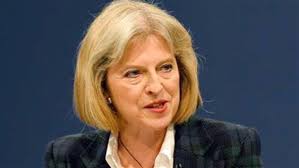"There should be no suggestion that the threat of vandalism should stop a statue of Margaret Thatcher from being put up," said May, who has dismissed parallels with her fearsome predecessor.
The plan is to put up the £300,000 (339,000 euros, $388,0000) bronze statue on Parliament Square next to political greats such as wartime prime minister Winston Churchill and Indian independence icon Mahatma Gandhi.
Thatcher, who was Conservative prime minister between 1979 and 1990, died in 2013 aged 87, leaving a divisive legacy that has attracted vandals in the past.
In 2002, a protester decapitated an Italian marble statue of Thatcher in London's Guildhall Library.
Following her death, graffiti went up around London including one mural reading "Burn in Hell Maggie".
Responding to a planning application for Thatcher's statue to be put up in Parliament Square, a conservation group said a principle of leaving a 10-year gap between the death of a subject and the installation of a statue should be adhered to.
"While Lady Thatcher was also widely respected it cannot be said that she was uncontroversial in this country," The Thorney Island Society said.
"There is a strong case for the 10-year rule to be respected - there should be a decent interval before permanent statues are erected, especially when they are controversial enough to risk vandalism."
The Royal Parks organisation, which manages the land on which the statue would be installed, also objected saying it was not sure Thatcher's family approved.
"Numerous times we have requested assurances from the applicant that they have approval from the family for the statue. To date we have not had those assurances," the Royal Parks said in a letter.
Ivan Saxton, the co-founder of the Public Memorials Appeal Trust which raised funds for the statue, last year said that Thatcher's daughter Carol was opposed to because "there's no handbag".
Thatcher was famous for her wide selection of handbags, which became a symbol of steadfastness, and can now fetch tens of thousands of pounds (dollars) at auctions.
Her programme of privatisations and deregulation helped turn around Britain's ailing economy and she is also credited with playing a leading role in ending the Cold War.
But she remains a divisive figure, particularly in Britain's working-class heartlands, which suffered devastating industrial decline as a result of the economic rebalancing.
A bronze sculpture of Thatcher was unveiled inside the Houses of Parliament in 2007.
---------------------------------------------------------------------------------------------------------------------------
The plan is to put up the £300,000 (339,000 euros, $388,0000) bronze statue on Parliament Square next to political greats such as wartime prime minister Winston Churchill and Indian independence icon Mahatma Gandhi.
Thatcher, who was Conservative prime minister between 1979 and 1990, died in 2013 aged 87, leaving a divisive legacy that has attracted vandals in the past.
In 2002, a protester decapitated an Italian marble statue of Thatcher in London's Guildhall Library.
Following her death, graffiti went up around London including one mural reading "Burn in Hell Maggie".
Responding to a planning application for Thatcher's statue to be put up in Parliament Square, a conservation group said a principle of leaving a 10-year gap between the death of a subject and the installation of a statue should be adhered to.
"While Lady Thatcher was also widely respected it cannot be said that she was uncontroversial in this country," The Thorney Island Society said.
"There is a strong case for the 10-year rule to be respected - there should be a decent interval before permanent statues are erected, especially when they are controversial enough to risk vandalism."
The Royal Parks organisation, which manages the land on which the statue would be installed, also objected saying it was not sure Thatcher's family approved.
"Numerous times we have requested assurances from the applicant that they have approval from the family for the statue. To date we have not had those assurances," the Royal Parks said in a letter.
Ivan Saxton, the co-founder of the Public Memorials Appeal Trust which raised funds for the statue, last year said that Thatcher's daughter Carol was opposed to because "there's no handbag".
Thatcher was famous for her wide selection of handbags, which became a symbol of steadfastness, and can now fetch tens of thousands of pounds (dollars) at auctions.
Her programme of privatisations and deregulation helped turn around Britain's ailing economy and she is also credited with playing a leading role in ending the Cold War.
But she remains a divisive figure, particularly in Britain's working-class heartlands, which suffered devastating industrial decline as a result of the economic rebalancing.
A bronze sculpture of Thatcher was unveiled inside the Houses of Parliament in 2007.
---------------------------------------------------------------------------------------------------------------------------









 Home
Home Politics
Politics











